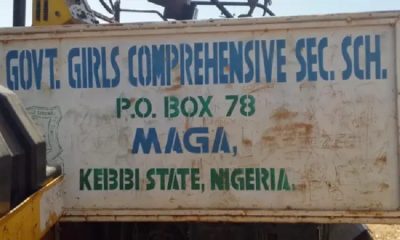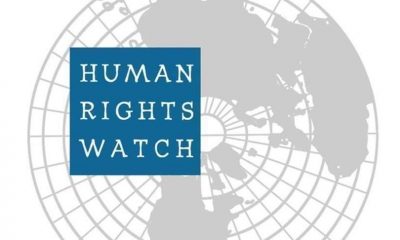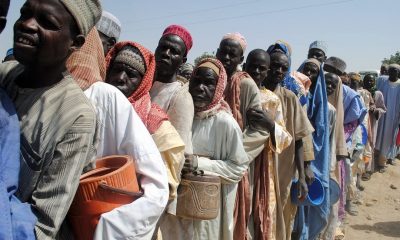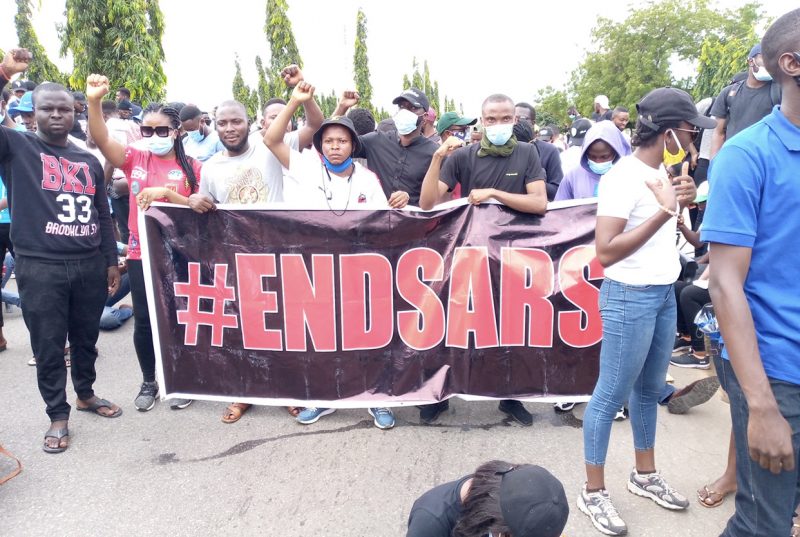General
EndSARS: Human Rights Watch Calls for Action on Panel Recommendations
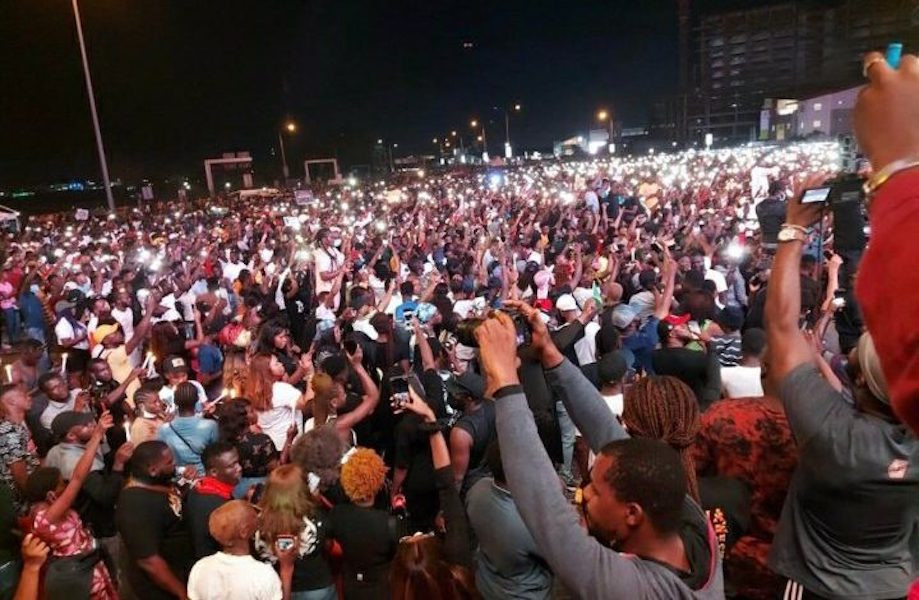
By Adedapo Adesanya
Human Rights Watch has called on Nigerian authorities to act on the #EndSARS panel recommendations and hold those responsible to account.
This call was made in a press statement on Monday in which the group accused the federal government of not making efforts to ensure justice for the killing of protesters in Lagos state in 2020, six months after a judicial panel implicated security forces in the abuses.
Speaking on this, Mr Anietie Ewang, Nigeria researcher at Human Rights Watch said, “The report of the judicial panel of inquiry should not be swept under the rug without any consequences for those responsible for killing and injuring protesters.
“A failure to act on the panel’s recommendations will send a painful message to victims and risks encouraging more violence by security officers.”
For context, in October 2020, young people across Nigeria took to the streets calling for the disbandment of an abusive police unit known as the Special Anti-Robbery Squad (SARS) and for an end to the brutality, in a movement using the hashtag #EndSARS.
Security forces responded with excessive force, including gunfire. One of the worst crackdowns was at the Lekki Toll Gate in Lagos on October 20, when army and police officers opened fire on a crowd of protesters, leaving people dead and wounded.
In response, the Lagos state governor, Mr Babajide Sanwolu, mandated a judicial panel of inquiry to investigate the incident and provide recommendations for justice and accountability.
The panel heard testimonies for a year from victims and representatives of the army, the police, and hospitals that treated victims. It was found in November 2021 that the security forces shot, injured, and killed unarmed protesters at the Lekki Toll Gate, corroborating Human Rights Watch findings.
The panel also presented a list of at least 48 casualties, including nine dead, four missing and presumed dead, and 21 wounded by gunshots. The panel recommended appropriate disciplinary measures and dismissals of army officers implicated in the abuses. The panel also recommended prosecuting police officers implicated in the indiscriminate shooting and killing of protesters at the toll gate and prompt payment of the compensation that the panel awarded to victims.
The Nigerian police and military authorities have neither taken further steps to independently investigate nor responded to the panel’s findings and recommendations.
The federal government, which has oversight of these institutions, rejected the panel’s recommendations. The Lagos state governor, who called for the investigation and gave assurances that victims would get closure, has also been quiet on the issue of accountability.
Nigeria has a poor history with judicial panels of inquiries, whose recommendations have no force of law and are often dependent on the responsible authorities to carry out the recommendations.
A lack of political will on justice and accountability has meant that past judicial panels including those set up to investigate mass extrajudicial killings in other contexts made no progress toward ending impunity for security force abuses.
Adding her input, Mrs Serah Ibrahim, a coordinator of the EndSARS Survivors’ Group, made up of victims of the Lekki Toll Gate incident and their families, told Human Rights Watch that she and other members of the group including those who are managing serious injuries from the shooting are following up with the Lagos state government officials.
She said they want to see justice done and compensation paid but it appears futile because state government officials have told them it is not up to them to determine what happens next.
“They don’t want to fish out [identify] the people who shot at us and they also do not want to pay compensation for what happened because it will be an admission of guilt,” she said.
“Sometimes I just want to move on because pursuing justice in Nigeria seems pointless, but I can’t because I know what happened and the impact it has had on the lives of victims and their families,” Mrs Ibrahim added
Following the submission of the Lagos judicial panel report to Governor Sanwolu, he set up another committee to review the contents and come up with a white paper to chart the way forward. The white paper, released in November 2021, rejected the panel’s key findings, including the death toll of nine, stating that there were substantial inconsistencies and a lack of adequate evidence to back the claim.
But the Lagos state government said it fully or partially accepted all but one of the panel’s recommendations that relate to its own authority and indicated that it would forward other recommendations to the appropriate authorities, including the federal government, the Police Service Commission, Nigeria Police Force, and the Nigerian Army.
The federal government through the Minister of Information, Mr Lai Mohammed, rejected the findings and recommendations of the panel though, and maintained the position it had taken since the incident occurred that reports of shooting and killing by security forces at the Lekki Toll Gate were “fake news.”
Justice and accountability should not be determined by the views of individual government ministers or officials but should rather be guaranteed for all Nigerians through independent systems and authorities mandated to investigate and act on allegations of abuses, Human Rights Watch said.
Within the Nigeria police force, there are several units including the X-Squad Unit of the Force Criminal Investigation Department (FCID) and the Provost Department, which are responsible for investigating offences by officers and recommending disciplinary actions and criminal prosecution where applicable. The Police Service Commission, which provides external oversight, also has the authority to investigate complaints and to mandate disciplinary actions, including dismissal, it added.
Similarly, the military police can investigate the actions of army officers implicated directly or indirectly in the abuses against protesters. An internal board of inquiry or regimental inquiry can also be set up to uncover the facts around their involvement and a court-martial process can be convened to discipline officers who engage in misconduct and ensure accountability,’ the group noted.
The executive secretary of Nigeria’s National Human Rights Commission, Mr Tony Ojukwu, told Human Rights Watch that it is because of the failure of the various internal systems for accountability to adequately do their jobs over the years that police and military officers have continued to act with impunity.
“Nigerian authorities have evaded their responsibilities to identify, discipline, and prosecute security officers involved in abuses.
“Unless this changes, violence by security forces against ordinary citizens will continue,” Mr Ewang added.
General
Deep Blue Project: Mobereola Seeks Air Force Support

By Adedapo Adesanya
The Director General of the Nigerian Maritime Administration and Safety Agency (NIMASA), Mr Dayo Mobereola, is seeking enhanced cooperation between the agency and the Nigerian Air Force (NAF) with the aim of strengthening tactical air support within the Deep Blue project.
During a courtesy visit last week, Mr Mobereola told the Chief of Air Staff, Air Marshall S. K. Aneke at the NAF Headquarters in Abuja, that the Air Force was a strategic partner in enhancing maritime security in Nigeria and sustaining the momentum of the Deep Blue Project’s success.
According to the DG, “We are here to seek the Air Force’s support, given the importance of tactical air surveillance to the Deep Blue Project. Nigeria is the only African country with a record of zero piracy within the last 4 years. The Deep Blue Project platforms have been used to achieve zero piracy and sea robberies in the Gulf of Guinea, and we need your collaboration to sustain this momentum”.
He further emphasised that international trade depends on security, which is why vessels prefer to go to or transit through countries where they are secured. “With the traffic we have now, we need to show more security might through collaboration to strengthen our trade viability because of the risks attached to our route. We need these collaborations to sustain what we have achieved so far with the Deep Blue Project”.
The NIMASA DG expressed hope that the collaboration with the Nigeria Air Force will reduce response time.
On his part, the Chief of Air Staff, Air Marshall S.K. Aneke, noted that the Air Force desires to be “a very supportive and collaborative partner with NIMASA and is ready to match the Agency step by step and side by side to achieve the desired results.”
He noted that “collaboration between NIMASA and the Nigerian Air Force under the Deep Blue Project can be strengthened through a joint strategic framework, integrated command structures, and a standing steering committee to ensure shared objectives and accountability.
“Establishing a joint maritime domain awareness fusion cell will enable real-time intelligence sharing, synchronised surveillance, and faster response to maritime threats and ensure sustained operational effectiveness across Nigeria’s territorial waters and exclusive economic zone,” he said, according to a statement.
The Air Force Chief added that the Air Force can also support NIMASA outside the Deep Blue Project operations by providing its own ISR platforms, tactical air support, and rapid airborne deployment for interdictions and search and rescue missions.
While thanking the NIMASA DG for the basic trainings the Agency has provided the aircraft pilots under the Deep Blue Project, Air Marshall Aneke also highlighted areas of operational challenges needing NIMASA’s attention to include bridging the communication gap between NAF operators and NIMASA, higher level and in-depth maintenance trainings, readily available fueling of aircrafts to avoid delays on missions, and provision of flying kits among others.
He therefore pledged the Air Force’s collaboration and assured that the request by NIMASA has been noted and that things will begin to move at thrice its speed going forward.
General
Nigeria’s Democracy Suffocating Under Tinubu—Atiku

By Modupe Gbadeyanka
Former Vice President, Mr Atiku Abubakar, has lambasted the administration of President Bola Tinubu for the turnout at the FCT Area Council elections held last Saturday.
In a statement signed by his Media Office, the Adamawa-born politician claimed that the health of Nigeria’s democracy under the current administration was under threat.
According to him, “When citizens lose faith that their votes matter, democracy begins to die. What we are witnessing is not mere voter apathy. It is a direct consequence of an administration that governs with a chokehold on pluralism. Democracy in Nigeria is being suffocated slowly, steadily, and dangerously.”
He warned that the steady erosion of participatory governance, if left unchecked, could inflict irreversible damage on the democratic fabric painstakingly built over decades.
“A democracy without vibrant opposition, without free political competition, and without public confidence is democracy in name only. If this chokehold is not released, history will record this era as the period when our hard-won freedoms were traded for fear and conformity,” he stressed.
Mr Atiku said the turnout for the poll was below 20 per cent, with the Abuja Municipal Area Council (AMAC) recording 7.8 per cent.
He noted that such civic participation in the nation’s capital, the symbolic heartbeat of the federation, is not accidental, as it is the predictable outcome of a political environment poisoned by intolerance, intimidation, and the systematic weakening of opposition voices.
The presidential candidate of the People’s Democratic Party (PDP) in the 2023 general elections stated that the ruling All Progressives Congress (APC) under Mr Tinubu has pursued a deliberate policy of shrinking democratic space, harassing dissenters, coercing defectors, and fostering a climate where alternative political viewpoints are treated as threats rather than contributions to national development.
He called on opposition parties and democratic forces across the country to urgently close ranks and forge a united front, declaring, “This is no longer about party lines; it is about preserving the Republic. The time to stand together to rescue and rebuild Nigeria is now.”
General
Nigeria Eyes Full Entry into Council of Palm Oil Producing Countries

By Adedapo Adesanya
Nigeria is set to validate a technical committee report geared towards transitioning the country from observer status to full membership of the Council of Palm Oil Producing Countries (CPOPC) in April.
Mr Abubakar Kyari, Minister of Agriculture and Food Security, said this when the council’s mission visited him over the weekend in Abuja, noting that the ministry had constituted a technical committee to consider how the country would seamlessly transit from observer country to membership in CPOPC based on its strategic importance in palm oil production.
“We are conscious of the fact that the palm oil value chain is very strategic for us and identified it as an export crop that can drive foreign exchange for the country and ensure good health in terms of consumption.
“We are conscious of the fact that we need the support of CPOPC countries to provide the country with a new variety of seeds that are climate-smart and resistant so that they can be produced by farmers in the country,” he said.
Mr Alphonsus Inyang, President, National Palm Produce Association of Nigeria (NPPAN), said being a member of CPOPC Nigeria would target over 10 million tonnes of oil palm between 2026 and 2050.
“We are also targeting 2.5 million hectares from among Nigeria households who are out to produce one hectare each, geared towards a N20 trillion annual economy within this period from among Nigeria households.
“We are working side by side with the big players who will be developing plantations,” he said.
The Secretary-General of CPOPC, Ms Izzana Salleh, said the council’s mission to Nigeria was to see how the country could transit from observer status to full membership, among others
She said that the status of the country as an observer nation since 2024 would expire by November.
Ms Salleh assured the country of the council’s readiness to support its vision to strengthen domestic production, enhance food security and build a competitive and sustainable palm oil supply chain.
The official emphasised that being a member of the council would strategically position Nigeria for a greater future regarding oil palm production.
According to her, the visit is to strengthen the council’s engagement with Nigeria, including potential membership in CPOPC.
She said: “The council’s mission to Nigeria aims to advance both Nigeria’s national ambitions and Africa’s collective voice in global agricultural discussions.
“CPOPC was established to promote cooperation among producing nations, empower smallholders, advance sustainability, and ensure fair, science-based global dialogue on vegetable oils.
She emphasised that being a member of the council would strategically position the country for greater future prospects regarding oil palm production and the value chain, as well as export.
“We are ready to support Nigeria’s vision to strengthen domestic production, enhance food security, and build a competitive and sustainable palm oil supply chain,” she said.
-

 Feature/OPED6 years ago
Feature/OPED6 years agoDavos was Different this year
-
Travel/Tourism10 years ago
Lagos Seals Western Lodge Hotel In Ikorodu
-

 Showbiz3 years ago
Showbiz3 years agoEstranged Lover Releases Videos of Empress Njamah Bathing
-

 Banking8 years ago
Banking8 years agoSort Codes of GTBank Branches in Nigeria
-

 Economy3 years ago
Economy3 years agoSubsidy Removal: CNG at N130 Per Litre Cheaper Than Petrol—IPMAN
-

 Banking3 years ago
Banking3 years agoSort Codes of UBA Branches in Nigeria
-

 Banking3 years ago
Banking3 years agoFirst Bank Announces Planned Downtime
-

 Sports3 years ago
Sports3 years agoHighest Paid Nigerian Footballer – How Much Do Nigerian Footballers Earn


